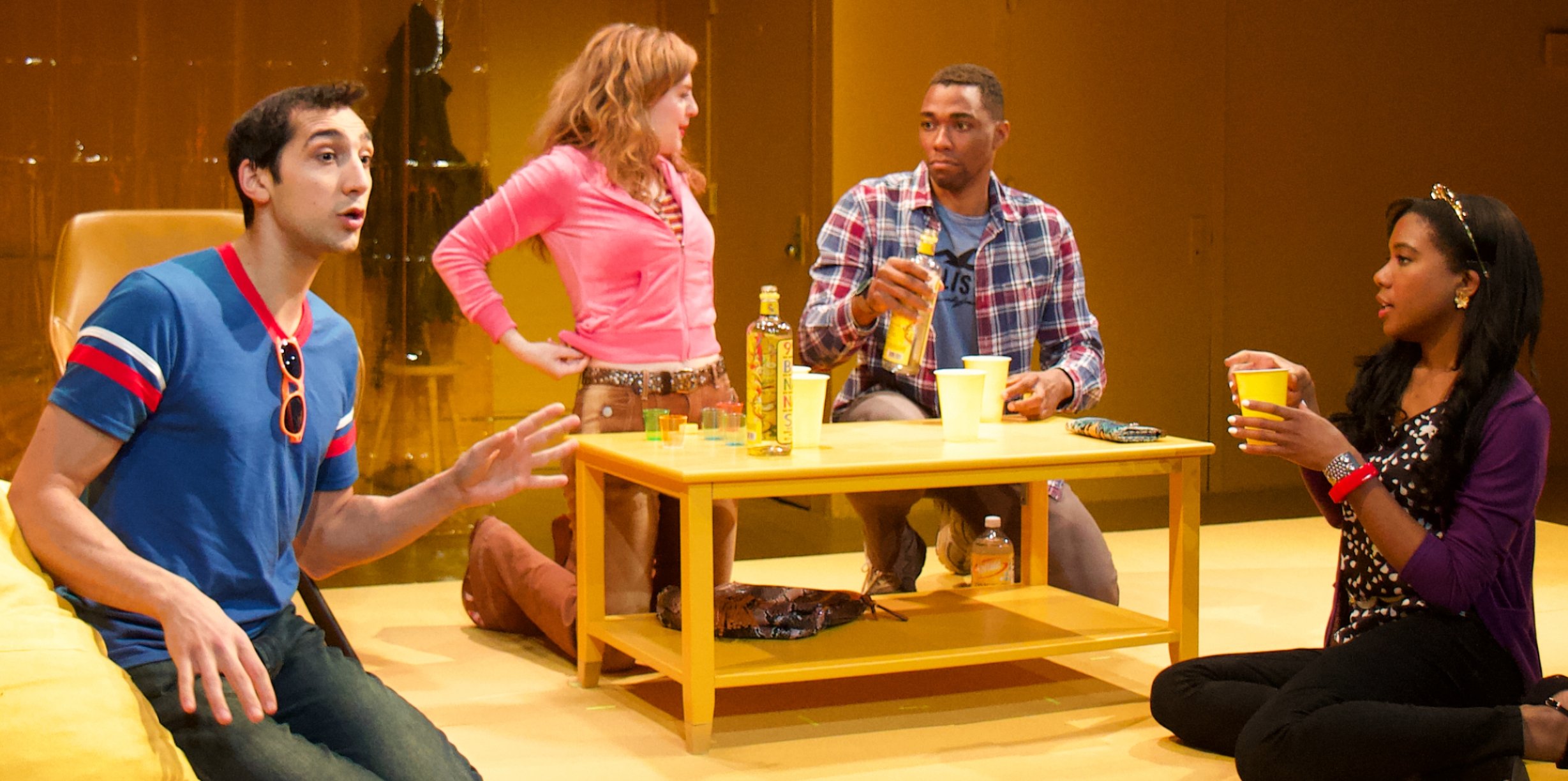From left: in Johnny G. Lloyd’s birthday birthday birthday, the “four musketeers” Clark (Justin Ahdoot), Juliette (Dana Berger), Dustin (Omari K. Chancellor) and Marissa (Portland Thomas) celebrate Clark and Marissa’s joint 21st birthday.
Johnny G. Lloyd’s birthday birthday birthday follows a group of friends throughout the years as they celebrate milestone birthdays that two in their group share. The play begins as Marissa (Portland Thomas) and Clark (Justin Ahdoot) gather for their 21st-birthday party with their friends amid conversations about class, race, sexuality, hopes and dreams—with a helping of drugs, fights, cheating and gossip.
The group of “musketeers,” as they refer to themselves, includes Dustin (Omari K. Chancellor), who appears to have romantic tensions with Marissa, as their conversation betrays a history that will continually push and pull at their friendship throughout the years. Also present are Juliette (Dana Berger), a rich, white nepo baby who doesn’t fit in easily with this diverse group, and the aloof Amanda (Anita Castillo-Halvorssen), who always seems to have one foot out the door. Finally, Remy Germinario plays Clark’s various boyfriends over the years.
Dustin and Marissa share a special connection that creates tension over the years. Photographs by Mari Eimas-Dietrich.
A decade later, at Clark and Marissa’s 31st birthday, all the characters have evolved. Marissa has a good job but is in a seemingly loveless marriage and revels in calling out her friends on their hypocrisy even if it hurts them. “You’re just being honest,” Amanda tells her. “This friend group’s whole thing was honesty. Maybe honesty is why I feel so … miserable.” Clark is lost in apathy, having no fight in him against a newer, racist boyfriend. Dustin is now married to Juliette and struggling to acknowledge his newfound privilege, and Amanda is torn between her family back home and her life in the city.
Up to this point the piece feels like a fine, funny sitcom, a mix of Friends and The Boys in the Band in a modern setting. But then Lloyd shifts it into the far future—their 131st birthday, after they have been transposed to a digital world—and the piece becomes an introspective dissection of these time periods in the characters’ lives and into their memories of it. And that is where Lloyd’s script shines, as it adds depth to a concept that was fun but simple at first.
“I miss the not knowing. … I miss the taking for granted,” concludes Dustin, as Marissa chooses to remember their 41st birthday with the hindsight of having lived full lives since. “I think I thought I was happy then,” she says, as she sees yet another birthday end in strife, with the group seemingly more torn than ever. “I wanted to see myself—feel myself—like I remembered myself.”
She is joined by a digital Clark. It is left purposely unclear if he is alive and connected somewhere or if there is only a copy of his mind in the software. And the show questions if the difference between those two options matters.
This concept is strengthened by lighting designer David De Carli’s use of color. The bright neon shifts from yellow to orange and blue to mark time periods, while bright flashes help delimit memory scenes vs. the present.
Remy Germinario (center, with Clark, left, and Dustin right) shines as all of Clark’s various boyfriends.
Will Steinberger’s direction does a good job of separating the eras and the settings without going too far into the surrealism. The production is also aided by Tina McCartney’s costumes, which mark the different eras they jump into and out of, with the exception of the far future. There the characters remain in everyday clothes.
All the actors do a good job portraying their characters in various stages of their lives. Some are better at portraying them younger: Berger plays the young, privileged, and drugged-up teen very well, and Thomas adds a depth to young Marissa that helps empathize with her journey. Others are better at portraying them older: Ahdoot’s quiet yet charming anxiety as Clark gets older is touching. Remy Germinario deserves special mention: he portrays multiple characters in different and always entertaining ways, going from an almost satirical flaming gay to a “dude bro” financier to a sweet, down-to-earth guy in hilarious fashion.
Lloyd’s ending shows influences that seem to come from such works as Merrily, We Roll Along or The Bicentennial Man. The show does leave some areas unexplored: for example, in the far future, apparently, Florida has seceded from the union, and then been bombed into a wasteland. The unanswered questions, however, do not detract from an introspective play with a strong emotional core.
Johnny G. Lloyd’s birthday birthday birthday runs through April 19 at the Tank (312 W. 36th St. between Eighth and Ninth avenues). Performances are at 7 p.m. Monday, and Wednesday through Saturday, and at 3 p.m. Sunday. For information and tickets, call (212) 563-6269 or visit thetanknyc.org.





